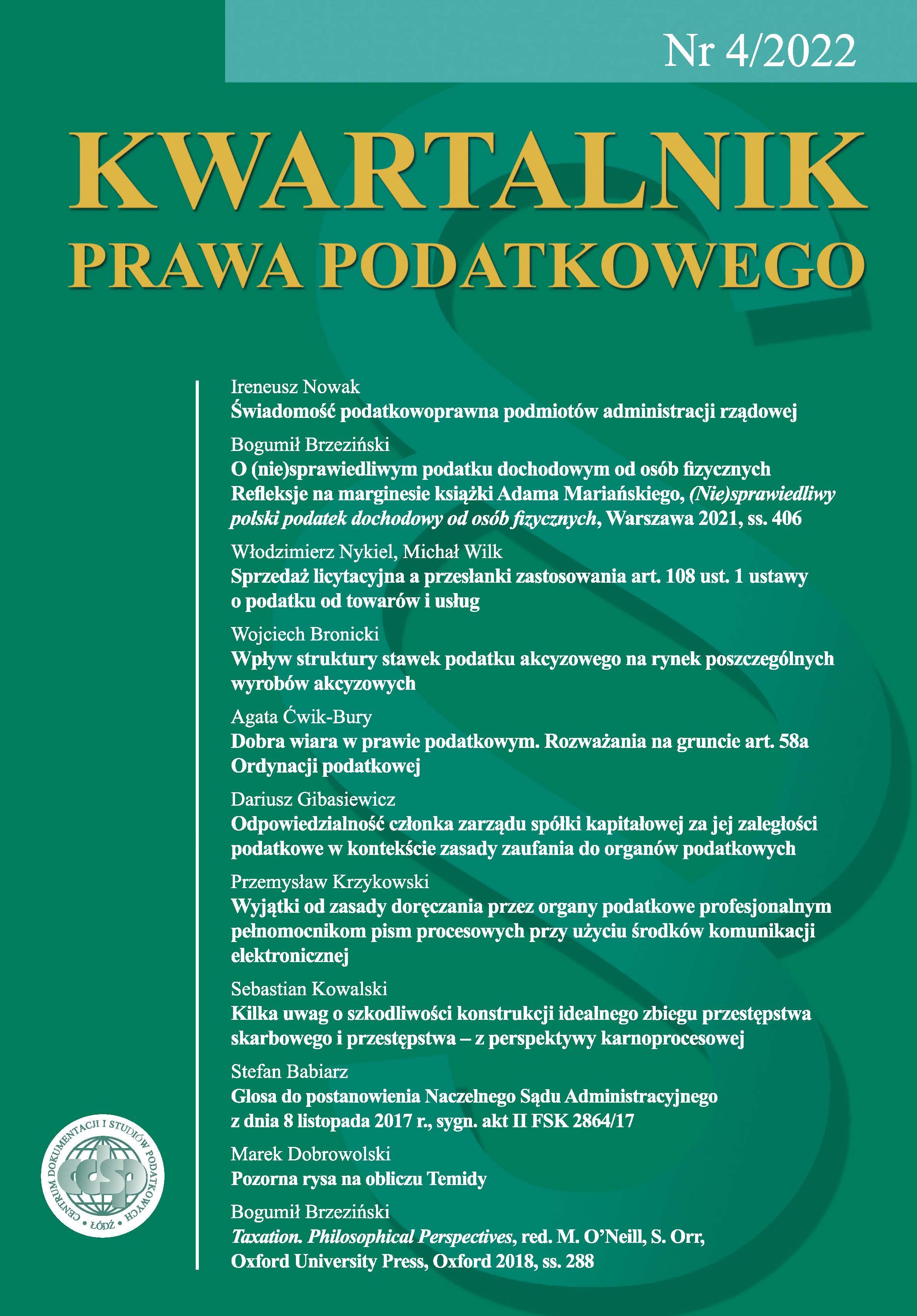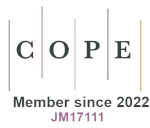Gloss to the decision of the Supreme Administrative Court of 8 November 2017, file ref. no. II FSK 2864/17
DOI:
https://doi.org/10.18778/1509-877X.2022.04.09Keywords:
civil-law transaction tax, Act on income of local government units, distribution of proceeds from tax on civil-law transactions between municipalities, substantive technical actions, complaint to administrative court on substantive technical action, right, obligationAbstract
Article 4(1)(1)(h) and Article 16(4) of the Act on income of local government units state that proceeds from the tax on civil-law transactions are transferred to the account of the budget of the municipality (gmina) in the area where the seat of the enterprise or its organized part is located. According to Article 11 of this Act, the tax authority transfers these funds to the budget account of the relevant local government unit within 14 days from the day they are credited to the account of the tax office. The distribution of funds on account of this tax is made by a notary as the withholding agent (Article 8 of the Tax Ordinance Act) by preparing a declaration on the amount of tax collected and paid by the withholding agent, including information (constituting a tax declaration within the meaning of Article 3(5) of the TOA) on the amount of tax due to individual municipalities. It follows from the aforementioned regulations that this information, as a tax declaration, is subject to verification pursuant to Article 272 et seq. of the TOA. Furthermore, it is a substantive technical action (Article 3, § 2(4) of the Act: Law on Proceedings before Administrative Courts) thanks to which a municipality that has received less money from the tax on civil-law transactions and wishes to exercise the right to challenge this distribution (Article 133, § 1 of the TOA), as a party to these transfer proceedings, may file a complaint with an administrative court in accordance with Article 3, § 2(4) of the LPAC. The Court’s view that there is no administrative court route in this matter, forcing the municipality to commence proceedings before a common court, is wrong because it does not take into account the aforementioned legal regulations and fails to recognize that they are different from the procedure for distributing funds due to municipalities from income taxes.
Downloads
References
Adamiak B., Z problematyki właściwości sądów administracyjnych (art. 3 § 2 pkt 4 p.p.s.a.), „Zeszyty Naukowe Sądownictwa Administracyjnego” 2006, nr 2.
Google Scholar
Bąk P., Gramatyka języka polskiego, Warszawa 1977.
Google Scholar
Błaś A., Prawne formy działania administracji, [w:] Prawo administracyjne, red. J. Boć, Wrocław 2007.
Google Scholar
Borodo A., Przejmowanie dochodów podatkowych przez gminy – niektóre problemy prawne, „Prawo Budżetowe Państwa i Samorządu” 2014, nr 3, https://doi.org/10.12775/PBPS.2014.026
Google Scholar
DOI: https://doi.org/10.12775/PBPS.2014.026
Brzeziński B., Podstawy wykładni prawa podatkowego, Gdańsk 2008.
Google Scholar
Chróścielewski W., Kmieciak Z., Tarno J.P., Reforma sądownictwa administracyjnego a standardy ochrony praw jednostki, „Państwo i Prawo” 2002, z. 12.
Google Scholar
Dauter B., Kabat A., Niezgódka-Medek M., Prawo o postępowaniu przed sądami administracyjnymi. Komentarz, Warszawa 2018, LEX/el.
Google Scholar
Dubis W., Zbieg roszczeń a skarga z bezpodstawnego wzbogacenia, „Przegląd Sądowy” 2002, nr 1.
Google Scholar
Filipczyk H., Podatek od czynności cywilnoprawnych, Warszawa 2015.
Google Scholar
Goettel M., Komentarz do art. 10, [w:] M. Goettel, A. Goettel, Podatek od czynności cywilnoprawnych. Komentarz, Warszawa 2007.
Google Scholar
Grochowski M., Skutki wyroków TK a bezpodstawne wzbogacenie. Założenia konstrukcyjne tle orzecznictwa, [w:] Skutki wyroków Trybunału Konstytucyjnego w sferze stosowania praw, red. M. Bernatt, J. Królikowski, M. Ziółkowski, Warszawa 2013.
Google Scholar
Księżak P., Glosa do wyroku SN z dnia 27 lutego 2004 r., V CK 272/03, „Monitor Prawniczy” 2005, nr 14.
Google Scholar
Księżak P., Naruszenie własności nieruchomości jako źródła bezpodstawnego wzbogacenia, „Rejent” 2006, nr 4.
Google Scholar
Łaszczyca G., Martysz Cz., Matan A., Inne akty lub czynności z zakresu administracji publicznej jako przedmiot skargi do sądu administracyjnego (art. 3 § 2 pkt 4 ustawy p.p.s.a.), [w:] Podmioty administracji publicznej i prawne formy ich działania. Studia i materiały z konferencji naukowej poświęconej jubileuszowi 80 urodzin Profesora Eugeniusza Ochędowskiego, red. Z. Chmiel, Toruń 2005.
Google Scholar
Łętowska E., Glosa do wyroku NSA z dnia 14 sierpnia 2002 r., sygn. II SA/Gd 4182/01, „Orzecznictwo Sądów Polskich” 2003, nr 10.
Google Scholar
Niezgoda A., Podział środków publicznych między państwo a jednostki samorządu terytorialnego, [w:] Źródła finansowania samorządu terytorialnego, red. A. Hanusz, Warszawa 2015.
Google Scholar
Nowy słownik poprawnej polszczyzny, red. A. Markowski, Warszawa 1990.
Google Scholar
Pest P., Udziały jednostek samorządu terytorialnego we wpływach z podatków dochodowych, Warszawa 2016.
Google Scholar
Słownik języka polskiego, red. M. Szymczak, Warszawa 1981.
Google Scholar
Słownik języka polskiego, red. W. Doroszewski, Warszawa 1967.
Google Scholar
Słownik poprawnej polszczyzny, red. W. Doroszewski, Warszawa 1981.
Google Scholar
Słownik współczesnego języka polskiego, red. B. Dunaj, Warszawa 1996.
Google Scholar
Szczygieł J., Charakter czynności redystrybucji podatku od czynności cywilnoprawnych, „Przegląd Podatków Lokalnych i Finansów Samorządowych” 2018, nr 8.
Google Scholar
Szober S., Gramatyka języka polskiego, Warszawa 1962.
Google Scholar
Uniwersalny słownik języka polskiego, red. S. Dubisz, Warszawa 2008.
Google Scholar
Downloads
Published
How to Cite
Issue
Section
License

This work is licensed under a Creative Commons Attribution-NonCommercial-NoDerivatives 4.0 International License.
PlumX metrics









